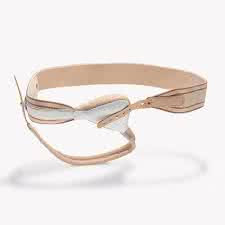Signification du mot truss en français
Que signifie truss en anglais ? Découvrez la signification, la prononciation et l'utilisation spécifique de ce mot avec Lingoland
truss
US /trʌs/
UK /trʌs/

Nom
1.
treillis, ferme
a framework, typically consisting of rafters, posts, and struts, supporting a roof, bridge, or other structure.
Exemple:
•
The bridge was supported by a series of steel trusses.
Le pont était soutenu par une série de treillis en acier.
•
Roof trusses were lifted into place by a crane.
Les fermes de toit ont été mises en place par une grue.
2.
ceinture herniaire
a device consisting of a pad and belt, worn to support a hernia.
Exemple:
•
The doctor recommended a truss for his inguinal hernia.
Le médecin a recommandé une ceinture herniaire pour sa hernie inguinale.
•
He had to wear a truss after the surgery.
Il a dû porter une ceinture herniaire après l'opération.
Verbe
1.
ligoter, ficeler
tie up (a person or their arms and legs) with ropes or cords.
Exemple:
•
The kidnappers trussed their victim before putting him in the van.
Les ravisseurs ont ligoté leur victime avant de la mettre dans la camionnette.
•
She was trussed up like a chicken.
Elle était ficelée comme un poulet.
2.
ficeler
tie up the wings and legs of (a fowl) before cooking.
Exemple:
•
The chef carefully trussed the chicken before roasting it.
Le chef a soigneusement ficelé le poulet avant de le rôtir.
•
It's important to truss a turkey to ensure even cooking.
Il est important de ficeler une dinde pour assurer une cuisson uniforme.